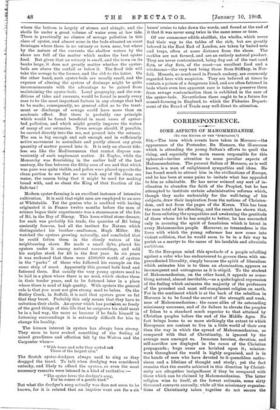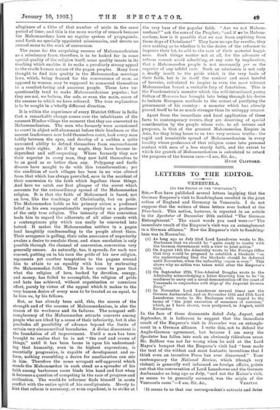CORRESPONDENCE.
SOME ASPECTS OF MAHOMMEDANISM.
ITO THE EDITOR OF THE "SPEOTATOR."]
SIR,—The turn which events have taken in Morocco—the appearance of the Pretender, Bu Hamara, the ill-success which is attending the young Sultan's efforts to quell the rising, and especially the main reason responsible for this upheaval—invites attention to some peculiar aspects of Mahommedanism. The present Sultan of Morocco, as is well known, is a. man of enlightened sympathies and ideas. He has found much to attract him in the civilisations of Europe, and he has been at some pains to imitate what has appealed to him as admirable. He has never evinced any sort of in- clination to abandon the faith of the Prophet, but he has attempted to institute certain administrative reforms which, though they make undeniably for the well-being of his subjects, draw their inspiration from the nations of Christen- dom, and not from the pages of the Koran. This has been the sum total of his offending, and the result has shown that, far from enlisting the sympathies and awakening the gratitude of those whose lot he has sought to better, he has succeeded only in arousing the spirit of fanaticism which is latent in every Mahommedan people. Moreover, so tremendous is the force with which the young reformer has now come into violent collision, that he would seem to be in a fair way to perish as a martyr to the cause of his laudable and altruistic ambitions.
To the European mind this spectacle of a people rebelling against a ruler who has endeavoured to govern them with un- precedented liberality, simply because the spirit of liberalism which animates him is to them an abomination, appears as inconsequent and outrageous as it is stupid. To the student of Mahommedanism, on the other hand, it appeals as some- thing natural, almost inevitable,—as a quite logical expression of the feeling which animates the majority of the professors of the proudest and most self-complacent religion on earth. For in the sentiment which is at the back of the rebellion in Morocco is to be found the secret of the strength and weak. ness of Mahommedanism : the cause alike of its astounding missionary successes, and of its failure to elevate the peoples of Islam to a standard much superior to that attained by Christian peoples before the end of the Middle Ages. No fact brings home to us more strikingly the extent to which Europeans are content to live in a little world of their own than the way in which the spread of Mahommedanism, as compared with that of Christianity, is ignored by the average man amongst us. Immense heroism, devotion, and self-sacrifice are displayed in the cause of the Christian propaganda ; huge sums are lavished upon it; mission- work throughout the world is highly organised, and is in the hands of men who have devoted to it quenchless enthu- siasm and a lifetime of thought and study; yet the fact remains that the results achieved in this direction by Christi- anity are altogether insignificant if they be compared with those which can be claimed by Mahommedanism. The litter religion wins to itself, at the lowest estimate, some sixty thousand converts annually, while all the missionary organisa- tions of Christianity taken together do not secure the
allegiance of a tithe of that number of souls in the same period of time; and this is the more worthy of remark because the Mahommedans have no regular system of propaganda, send forth no specially appointed missionaries, and devote no annual sums to the work of conversion.
The cause for the surprising success of Mahommedanism as a missionary force, therefore, is to be looked for in some special quality of the religion itself, some quality innate in its teaching which enables it to make a peculiarly strong appeal to the crude human nature of the pagan peoples. Many have thought to find this quality in the Mahommedan marriage laws, which, being framed for the convenience of man, as opposed to woman, may be supposed to commend themselves to a comfort-loving and amorous people. These laws un- questionably tend to make Mahommedanism popular; but they are not, we believe, the sole, or even the main, cause of the success to which we have referred. The true explanation is to be sought in It'wholly different direction.
It is within the experience of every District Officer in India that a remarkable change comes over the inhabitants of the meanest Hindoo village the moment that they are converted to Mahommedanism. The men who formerly were accustomed to crawl in abject self-abasement before their headmen or the nearest landowners now hold themselves erect, look every man boldly between the eyes, and develop of a sudden a quite unwonted ability to defend themselves from encroachment upon their rights. As if by magic, they have become in- dependent and self-respecting. Where formerly they saw their superior in every man, they now hold themselves to be as good as or better than any. Polygamy and facile divorce have naught to do with this transformation ; yet the condition of such villages has been in no wise altered from that which has always prevailed, save in the accident of their conversion to the faith which legalises these things. And here we catch our first glimpse of the secret which accounts for the extraordinary spread of the Mahommedan religion. It is that the faith of Mahommed is based, not on love, like the teachings of Christianity, but on pride. The Mahommedan holds as his primary axiom a profound belief in his own unquestionable superiority as a professor of the only true religion. The intensity of this conviction leads him to regard the adherents of all other creeds with a contemptuous pity which can easily be converted into hatred. It makes the Mahommedan settlers in a pagan land haughtily condescending to the people about them. Their arrogance is galling, their calm assurance of superiority awakes a desire to emulate them, and since emulation is only possible through the channel of conversion, conversion very generally ensues. As naturally, too, it spreads, for each new convert, putting on in his turn the pride of his new religion, represents yet another temptation to the pagans around him to attain to an equality with him by embracing the Mahommedan faith. Thus it has come to pass that what the religion of love, backed by devotion, energy, and money, has failed to accomplish, the religion of pride and hate has achieved, without organisation or conscious effort, purely by virtue of the appeal which it makes to the very human desire of every man to be treated as an equal, to be bien vu, by his fellows.
But, as has already been said, this, the source of the strength and of the success of Mahommedanism, is also the reason of• its weakness and its failures. The arrogant self- complacency of the Mahommedan attracts converts among people who are irked by a sense of their inferiority, but it also precludes all possibility of advance beyond the limits of certain very circumscribed boundaries. A divine discontent is the foundation of all improvement. Until a man has been brought to realise that he is not " the roof and crown of things," until it has been borne in upon his understand- ing that humanity, even in its highest expressions, is essentially progressive, is capable of development and re- form, nothing resembling a desire for amelioration can stir in him. Therefore the same arrogant self-approval which stands the Mahommedan in such stead as a spreader of his faith among barbarous races binds him hand and foot when it becomes a question of competing in the race of progress and civilisation. The would-be reformer finds himself in acute conflict with the entire spirit of his coreligionists. Merely to hint that reform is necessary, or even expedient, is to strike at the very base of the popular faith. " Are we not Mahom- medans?" ask the sons of the Prophet; "and if we be Mahom- medans, how is it possible that we can learn anything from these dogs of Christians?" They have no eye for results; they care nothing as to whether it be the desire of the reformer to improve their lot, to add to the sum of their material happi- ness. Such things matter not at all, for the advocate of reform cannot avoid admitting, at any rate by implication, that a Mahommedan people is not necessarily per se the superior of any infidel race. Such an admission is not only a deadly insult to the pride which is the very basis of their faith, but is in itself the rankest and most hateful of heresies, calculated to inspire in even the most tolerant Mahommedan breast a veritable fury of fanaticism. This is the Frankenstein's monster which the well-intentioned young Sultan of Morocco has brought into being through his desire to imitate European methods to the extent of purifying the government of his country : a monster which has already proved itself to be so much stronger than its unhappy creator.
Apart from the immediate and local application of these facts to contemporary events, they are deserving of special consideration by the people whose rule, to all intents and purposes, is that of the greatest Mahommedan Empire in Asia, for they bring home to us two very serious truths : the rapid and irresistible spread of Mahommedanism in every locality where professors of that religion come into personal contact with men of a less sturdy faith, and the extent to which the growth of Mahommedanism is calculated to retard the progress of the human raee.—I am, Sir, &c.,
HUGS CLIFFORD.







































 Previous page
Previous page